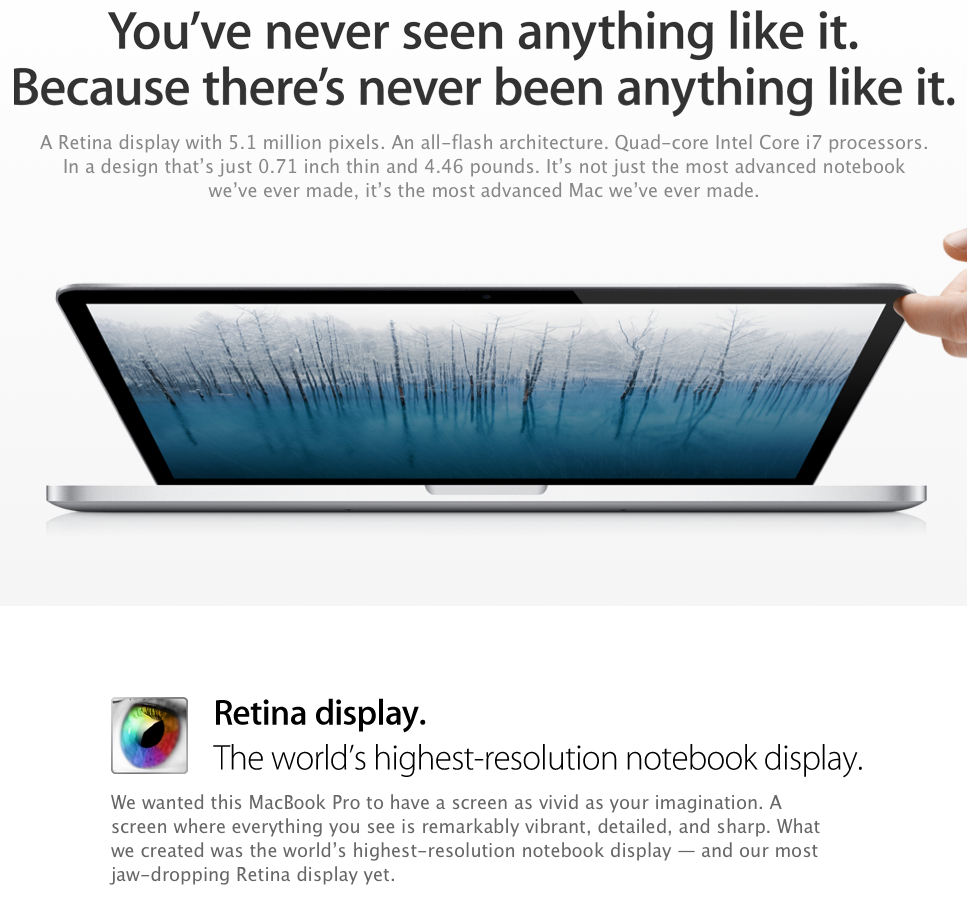UPDATE: And… they’re back. In a weird first-person letter from Bob Mansfield currently on Apple’s Environment page:
We’ve recently heard from many loyal Apple customers who were disappointed to learn that we had removed our products from the EPEAT rating system. I recognize that this was a mistake. Starting today, all eligible Apple products are back on EPEAT.
The problem now is that fewer and fewer Apple products are currently eligible for EPEAT. Apple’s next move will likely be to push a changing standard of recyclability into the EPEAT spec so that their products like the Air and the new Retina MacBook Pro are technically eligible once more. It’s bold, and it’s arrogant, and it’s a quick resolution to something that clearly surprised the company.
—
Here’s the word from CNET:
Apple has decided to stop participating in a major program devoted to the production of environmentally friendly products, reportedly saying that its design direction is no longer in line with the program’s requirements.
Late last month, Apple told the nonprofit EPEAT group that the company would no longer submit its products for green certification from EPEAT and that it was pulling its currently certified products from the group’s registry.
First, let’s not mistake this move as a signal that Apple is suddenly going to be dropping old laptops into the chipper and flushing the shavings into our water supply. They might, but I doubt it. A move like that presumes that the company was only manufacturing according to the green standard because the standard exists. I find that terribly hard to believe—I can’t think of many consumer electronics manufacturers that are outright evil.
I’m writing this on my new favorite computer ever. It’s the new 11.6“ MacBook Air, and I love it as much as I loved my old 10” PowerBook from years back. I’ve owned several laptops between then and now, and this one is the best, fastest, most comfortable of the lot. Much of that love comes from the form factor—the razorblade taper and the full-sized keyboard make for a brilliant combination.
But the thinner Apple makes their machines, like this MacBook Air, the more custom the components have to be—standard hard drives and memory and fans just don’t fit in this device. That makes it hard for outsiders like iFixIt to dig into them, but that doesn’t make them any less disposable. It makes them less disposable for anyone who isn’t Apple.
Apple maintains it’s own recycling program and from everything I can find, that program is not in any danger. Apple pulling out of EPEAT is first and foremost a signal that Apple is best equipped to disassemble and competently recycle their own products, and outside agencies are not equipped to pass judgement on that recyclability. Apple built it, Apple knows best how to tear it apart.
What is the role of the EPEAT certification in the sales process? How many times have you walked into the Apple Store and made a buying decision based on EPEAT rating? Me? Never. Maybe the green statement has cemented my decision as a good one, but it has never been a determining factor. And it’s never, ever come up in a conversation with a floor salesperson. Never.
My sense is that the certification is box decoration, and Apple is confident enough in their internal processes that they don’t need the box decoration to move those boxes. You could make the case that this damages EPEAT more than any other party, which would be a shame. Lobbying efforts on behalf of the environment are important, even if the box decoration is not.

